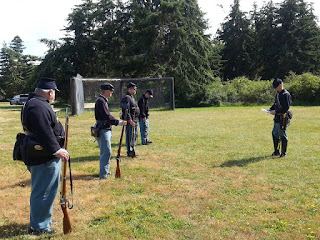As the war goes on, popular songs begin to reflect some of it's less-pleasant realities. Following 1862's courageous rallying songs, those from 1863-5 directly address homesickness, conscription, imprisonment, and death.
One of the more uplifting numbers, in my opinion, is George F. Root's 1864 "The Prisoner's Hope", also known by the first line of its refrain as "Tramp! Tramp! Tramp!". Here's sheet music, a lyric sheet, and an 1865 sequel "On, On, On The Boys Came Marching!". The following lyrics are taken from Beadle's Dime Song Book, vol. 16 (1864):
In the prison cell I sit,
Thinking, mother dear, of you,
And our bright and happy home so far away:
And the tears they fill my eyes,
Spite of all that I can do,
Though I try to cheer my comrades and be gay.
Chorus.
Tramp, tramp, tramp, the boys are marching,
Cheer up, comrades, they will come
And beneath the starry flag
We shall breathe the air again
Of the free land in our own beloved home.
In the battle front we stood
When their fiercest charge they made,
And they swept us oil a hundred men or more;
But before we reached their lines,
They were beaten back dismayed,
And we heard the cry of victory o'er and o'er.
Chorus
So within the prison cell,
We are waiting for the day
That shall come to open wide the iron door;
And the hollow eye grows bright,
And the poor heart almost gay,
As we think of seeing home and friends once more.
Chorus
Here are some of the recordings available on-line (and alternate verses).
Blog for the reenactors of the 4th US Regular Infantry, keeping Civil War history alive in Washington State.
Friday, June 24, 2016
Thursday, June 23, 2016
Event: Battle of Fullbright Park (Union Gap, WA)
The second WCWA reenactment of the season took place last weekend at Union Gap's Fullbright Park. Captain Jones reports that the 4th "made numbers", ie, had a least 8 pre-registered soldiers participate in the event. We were also fortunate to be joined by Mr. Spellman of the 12th US, and by a new recruit. The Union Soldiers' Aid Society was on-hand to provide refreshments.
Under the leadership of Captain Jones, Sergeants Strand & Hicks, and Corporal Franks, the 4th acquitted themselves with courage valor, most notably holding off the entire rebel line to permit a flank maneuver by the volunteers. Unfortunately, this was not enough to prevent a rebel raid on the union camp. [Note to the War Department: consider recruiting Miss D. and her frying pan for special defense objectives.]
Special thanks to Messrs. Strand and Mosby for transporting the company trailor, Mr. Strand for providing the mess, and Mr. & Mrs. Talbott for securing USAS supplies. The young men of the 4th, notably Messrs. Franks, Franks, and Walker, worked very hard to set up and strike camp, and were in regular attendance on the ladies, as best their duties would permit.
The event was documented here (including aerial shots of the battles). As the blogmistress's camera malfunctioned, pictures are from Sgt. Hicks.
Under the leadership of Captain Jones, Sergeants Strand & Hicks, and Corporal Franks, the 4th acquitted themselves with courage valor, most notably holding off the entire rebel line to permit a flank maneuver by the volunteers. Unfortunately, this was not enough to prevent a rebel raid on the union camp. [Note to the War Department: consider recruiting Miss D. and her frying pan for special defense objectives.]
Special thanks to Messrs. Strand and Mosby for transporting the company trailor, Mr. Strand for providing the mess, and Mr. & Mrs. Talbott for securing USAS supplies. The young men of the 4th, notably Messrs. Franks, Franks, and Walker, worked very hard to set up and strike camp, and were in regular attendance on the ladies, as best their duties would permit.
The event was documented here (including aerial shots of the battles). As the blogmistress's camera malfunctioned, pictures are from Sgt. Hicks.
 |
| USAS Sewing Circle |
 |
| Pre-Event Cartridge-Making Party |
 |
| Company Drill |
Monday, June 13, 2016
Event: School of the Regular
Over the weekend, the 4th held it's annual "school of the regular" training retreat. We have to look better than the volunteers, after all!
Mr. Strand organized the weekend at historic Fort Flagler. Mrs. Strand, with her usual efficiency, ran the mess. Recruiting Sergeant Hicks reported a satisfactory event, so it's safe to assume that the troops are in fine form for the upcoming engagements at Union Gap.
 |
| Better pay attention to General Grant. There might be a quiz. |
 |
| Captain Jones instructs the men. |
Wednesday, June 1, 2016
Accomplishments
All accomplishments have the one great merit of giving a lady something to do; something to preserve her from ennui; to console her in seclusion; to arouse her in grief; to compose her to occupation in joy. And none answers this purpose much better than fancy work, or even plain work. The former can often be brought advantageously into the rear of other pursuits--as a reserve. The latter cannot well be carried into society, except as a charity...Not that it is recommended to take into a party your husband's stockings to mend, or dear Charles's shirts, over which he was naturally so irritable at the absence of buttons, or Louisa's pinafores to run strings into; let the work have the characteristics of recreation combined with utility, and the most scrupulous cannot be offended. Such is indeed the spirit of the day; for we are a more sensible people than our grandsires were.
Sketching and archery stand first among out-door amusements. They are healthy, elegant, and appropriate to the feminine character; while--first thought of mammas!--they assemble rather than exclude the younger members of the other sex.
-The Habits of Good Society (1863), page 268-9
| The Croquet Match (1864) by George Elgar Hicks |
Subscribe to:
Posts (Atom)
